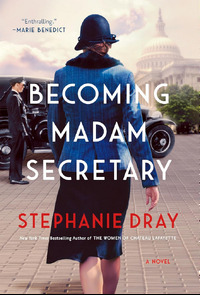For Stella Costa, the war in Tuscany begins over a featherbed. “That’s mine.”
Stella’s cousin Livia pushes her aside and hops onto the flowered coverlet, sending dust motes sparkling in the glow of a sunbeam. Livia is sixteen and has burst from her dusty pubescent cocoon into a colorful creature, old and beautiful enough to secure the mayor’s son as a fiancé. But in this moment, Stella watches her nearly grown cousin pout like any five-year-old.
“I got here first!” Stella’s younger cousin, Mariasole, scrambles up onto the high bed next to Livia.
“Peccato. I’m the oldest.” Livia shoves her little sister sideways until her head flops on the bed and her giggles go muffled in the messy quilt.
Stella doesn’t know her two cousins well enough to predict what will happen next. But caution isn’t Stella’s strong suit. Without thinking, she vaults on top of both girls. “I’ll fight you both for it!” she cries, pummeling her fists into the soft bedding.
More muffled giggling. Down feathers join the dust, rising and spinning in the light, then landing on the terracotta tiles. Beyond the open shutters, a flock of swifts wheels against the sky’s blue canvas, the silhouette of thin cypresses, and the Tuscan countryside beyond.
“Stella. Stellina!” Her aunt’s voice, sharp and snake-like, comes from nowhere. “Smettila. Subito!”
Stella feels sudden pain stab the left side of her face while her aunt yanks her roughly from the bed by her ear. Immediately, she is on her feet on the cold tiles, cowering under her aunt’s grip.
“Aya!” Stella presses her palm to her cheek. On the high bed, her two cousins sit up straight and cover their mouths. Their giggles trail off.
Zia Angela’s face is suddenly very close to Stella’s stinging ear. “Sir Harwell’s automobile is barely a speck on the horizon. And you . . . acting like you own this place” She stabs her thumb toward the window as if Stella could see the Englishman’s Aston Martin from here. Dust billowing along the winding Tuscan roads, halfway to Switzerland. “And a girl,” she continues, “using her fists Vergogna!”
Zia Angela flicks her cold hand away, releasing her grip at last.
Stella sinks into the closest chair and rubs her throbbing ear. “None of you will sleep here,” her aunt says, shooing the girls off the high bed and smoothing the coverlet. “Your father and I are taking this room. You girls will share the yellow room next door. In the stairwell.” From behind, Stella’s aunt looks lean and brittle, like a dried tree branch in a flowered dress. One that might snap at the slightest provocation.
Stella’s aunt turns and opens her mouth again, poised to resume scolding. But suddenly, Stella’s cousins dart out of the room. Stella follows, ducking under Zia Angela’s grasp. In the doorway, she nearly trips over Mariasole’s abandoned, battered leather shoes. Then she runs after her cousins, newly formed allies, who are already at the far end of the long corridor.
Stella, at twelve years old halfway between Mariasole and Livia, jogs to catch up with her cousins. Her ear still throbs with the dull ache of her aunt’s icy hand. She glimpses her cousins’ fluttering skirts up ahead, Mariasole spinning and skipping barefoot across the terracotta tiles.
“Finalmente! We will be countesses!” Mariasole cries, her voice echoing through the empty corridor. “Contessa Livia! Wait for me! Aspetta!” But her sister has already reached the base of the tower stair.
Jogging past the many closed doors, Stella feels tempted to stop chasing her cousins and turn a knob instead. She hasn’t entered any of these rooms yet. She’s only just arrived from Torino, where her mother bundled her into the back of a big car along with several other children and a Red Cross worker headed to family members to the south. Stella to Tuscany to stay with her uncle and aunt, who she’s met for the first time in her life.
It’s safer in the countryside, her mother told her for the thousandth time, pressing a warm, wrapped panino into her hands.
Stella’s cousins are new to the villa, too. They say they’ve moved their things from the caretaker’s cottage beyond the olive grove. The rich English couple who were living here asked Stella’s uncle to take care of things when they had to leave. Their father is just a driver, they say, but now he’s in charge of the whole place.
Each closed doorway promises hidden wonders. Secret chambers painted with mythical beings on the walls and ceilings. Filled with treasured possessions, forgotten keepsakes, silent histories tucked away in drawers and closets. Stella imagines peering through key- holes, exploring cupboards, under beds, inside the elaborately dec- orated storage cabinets newly vacated by their owners.
Ahead, Livia and Mariasole disappear up the coiled spine of the narrow watchtower. Stella’s slippery leather soles find the hollows of the stone treads, worn away under the weight of three hundred years. Through narrow, deeply splayed slits in the walls, Stella catches fleeting glimpses of spiky cypresses and distant lavender hills. A pink cloud hanging like a tuft of spun sugar in the bright sky.
She’s only been here a day. But despite being separated from her mother, and the dire circumstances that have led her to Tuscany and the Villa Santa Lucia in the first place, Stella feels a bud of excitement bloom in her chest. Here, in this magical villa, there is only the prospect of new life. It all seems far away from the shadows and desperation that brought her here.
Excerpted from THE KEEPER OF LOST ART by Laura Morelli. Copyright © 2025 by Laura Morelli. Reprinted courtesy of William Morrow, an imprint of HarperCollins Publishers.
During World War II, a girl makes an unbreakable connection with a boy sheltering in her family’s Tuscan villa, where the treasures of the Uffizi Galleries are hidden. A moving coming-of-age story about the power of art in wartime, based on true events.
As Allied bombs rain down on Torino in the autumn of 1942, Stella Costa’s mother sends her to safety with distant relatives in a Tuscan villa. There, Stella finds her family tasked with a great responsibility: hiding nearly 300 priceless masterpieces from Florence, including Botticelli’s famous Primavera.
With the arrival of German troops imminent, Stella finds herself a stranger in her family’s villa and she struggles to understand why her aunt doesn’t like her. She knows it has something to do with her parents—and the fact that her father, who is currently fighting at the front, has been largely absent from her life.
When a wave of refugees seeks shelter in the villa, Stella befriends Sandro, an orphaned boy with remarkable artistic talent. Amid the growing threats, Sandro and Stella take refuge in the villa’s “treasure room,” where the paintings are hidden. There, Botticelli’s masterpiece and other works of art become a solace, an inspiration, and the glue that bonds Stella and Sandro as the dangers grow.
A troop of German soldiers requisitions the villa and puts everyone to forced labor. Now, with the villa full of German soldiers, refugees, a secret guest, and hundreds of priceless treasures, no one knows who will emerge unscathed, and whether the paintings will be taken as spoils or become unintended casualties.
Inspired by the incredible true story of a single Tuscan villa used as a hiding place for the treasures of Florentine art during World War II, The Keeper of Lost Art takes readers on a breathtaking journey into one of the darkest chapters of Italy’s history, highlighting the incredible courage of everyday people to protect some of the most important works of art in western civilization.
Women's Fiction Historical [William Morrow Paperbacks, On Sale: April 22, 2025, Paperback / e-Book , ISBN: 9780063206014 / eISBN: 9780063206021]

Laura Morelli holds a Ph.D. in art history from Yale University, where she was a Bass Writing Fellow and Mellon Doctoral Fellow. She authored a column for National Geographic Traveler called "The Genuine Article" and contributes pieces about authentic travel to national magazines and newspapers. Laura has been featured on CNN Radio, Travel Today with Peter Greenberg, The Frommers Travel Show, and in USA TODAY, Departures, House & Garden Magazine, Traditional Home, the Denver Post, Miami Herald, The Chicago Tribune, and other media. Recently her art history lesson, "What's the difference between art and craft?" was produced and distributed by TED-Ed. Laura has taught college-level art history at Trinity College in Rome, as well as at Northeastern University, Merrimack College, St. Joseph College, and the College of Coastal Georgia. Laura has lived in five countries, including four years in Italy and four years in France.
No comments posted.


 © 2003-2025 off-the-edge.net
all rights reserved Privacy Policy
© 2003-2025 off-the-edge.net
all rights reserved Privacy Policy